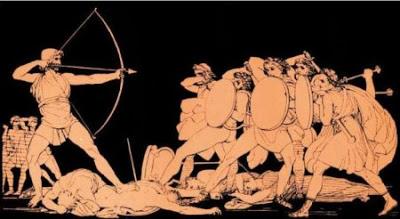by Paul J. Pelkonen

Bad things happened when Ulysses came home in 1178 B.C.
Image from classical antiquity.
Mr. Chinn's company does not appear often (this is just the third Opera Omnia production in the last six years) but when it does, they offer a chance to hear some interesting young singers specializing in the repertory of the 17th century. Here, they took Monteverdi's late masterpiece and trimmed it to a lean two and a half hours, omitting much of the opera's sweep, mythic grandeur and humor. The plus: the production retold the story in a concise, clear way that was ideal for the newcomer.
Monteverdi's opera was premiered in Venice at the very birth of the genre in 1639. However, the workwas lost until a version of the score was discovered in the 19th century. Ulysses anticipates many of the musico-dramatic ideas that came to the fore in the 19th and 20th centuries. Like a Wagner music drama, the vocal lines are principally concerned with dialogue, engaging in long interlocking recitatives that drive the story forward at the expense of vocal display. At the very birth of opera, this is music that was way ahead of its time.
The opera was mounted in the Howard Gilman Theater, a small venue on the fourth floor of the Baryshnikov Arts Center. The staging used the concrete bunker-like walls and big windows of this modern building as a framework for its vision of ancient Ithaca. Singers navigated a complex series of scaffoldings and staircases to indicate the different statuses of the characters, be they gods, heroes or (at one point) the walking dead.) The orchestra, a medium-sized period ensemble led by Avi Stein from the harpsichord, provided narrative drive despite occasional blurred rhythms.
Jesse Blumberg was a strong presence as Ulysses, a lanky physical presence with a melodious baritone, onstage charisma and a tendency to over-act. That charisma (and the stage cuts) put Ulysses firmly at the center of the action. Mr. Blumberg responded with an involving performance that invited the listener into the character's plight and eventual triumph. As Penelope, soprano Hai-Ting Chinn displayed a rich upper range and a potent tone that was perfect for the intimate performance loft space. She was particularly compelling in the final scenes of the drama, where Ulysses' wife must overcome her own doubts, fears and disbelief to accept the fact that her husbad has, in fact, returned.
And then there were Penelope's suitors, a trio of strong singers who were clearly having fun displaying their characters' smarmy Jersey Shore charms. With her husband away, her options included the swaggering baritone of Richard Lippold as Antonio, the brash tenr of Nicholas Tamagna as Peisander and the pliant countertenor of Brandon Snook as Anfimono. As the parasitic Iro, Joseph Gaines delivered a comic performance that climaxed with a moving suicide. All four characters exited to intermezzos, walking like zombies or specters under an eerie green light.
Both leads were supported by a good cast of talented voices who did their best to navigate the complex set of scaffolds and staircases jammed into one end of the venue. Tenor Karim Sulayman displayed a fine instrument as Eumete, the servant of Penelope. As the Gods (reduced to just two in number for this budget-minded performance, soprano Tammi Coil and bass Joe Chappell overcame some truly funky headgear to deliver compelling performances as Minerva and Neptune.

